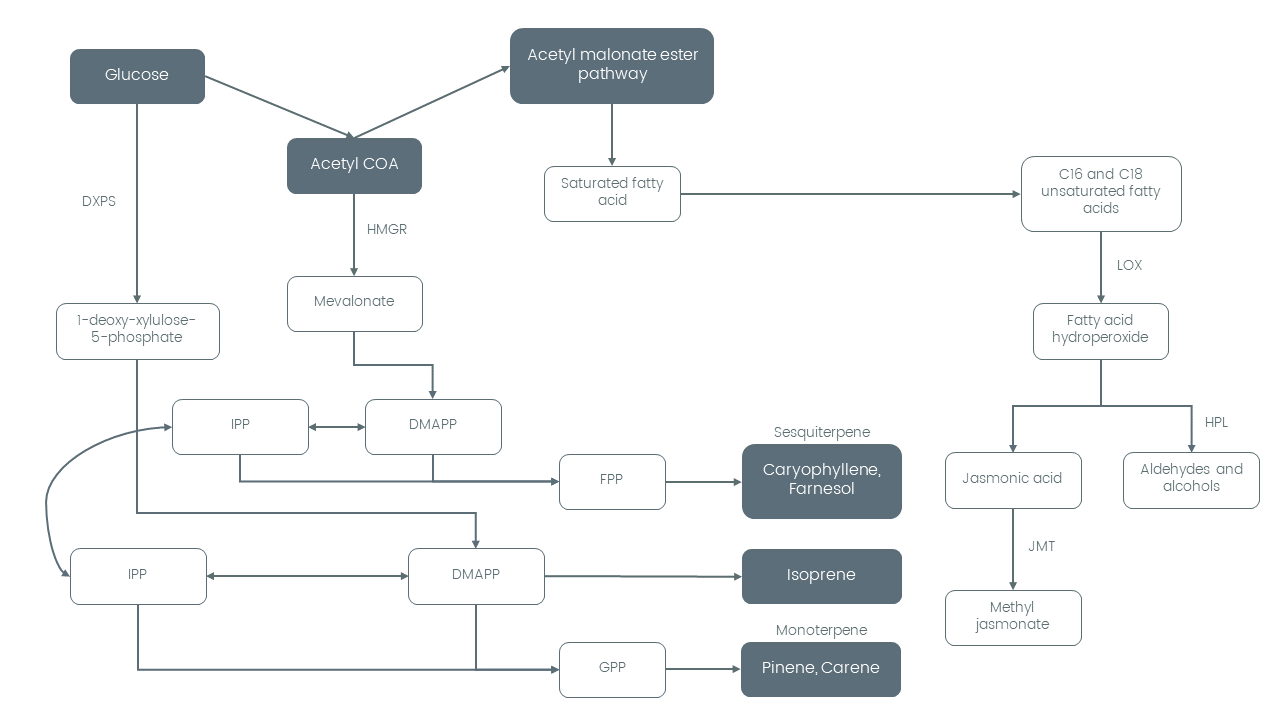Phytoncides – The Terpene Based Substances
for Household Products Innovation
Phytoncides – The Magic from Plants
The concept of Phytoncide was proposed by Dr. Boris P.Tokin, a Russian biochemist in 1928, He wrote a book named “
Phytoncides are volatile organic compounds derived from plants. The phytoncides effect sterilization and antimicrobial activities. They also heal man diseases effectively. The researchers found Phytoncides mainly contain α-pinene, β-pinene, 1,8-Cineole, γ-Terpinene, Camphene, Limonene. That means Phytoncides are Terpene-based monomers.
Schematic diagram for synthesis of terpene compounds emitted from plants. © Correlation between Terpenes Emission From Typical Forest Tree Species and Environmental Elements in Temperate Zone, 2016
The patents of Phytoncide were widely registered in Asia region. Air fresheners are the most mature application. Such as the car perfumes, toilet deodorants. Phytoncide used as active ingredients for the cigarette filter is the new innovation. Terpene-based ingredients strengthen the filtration ability of filter to tobacco tar, also bring the greeny scent to customers. In the personal care market. Terpene-based ingredients also effect disinfect property.
Change the tabs and learn about the commercial application by Phytoncides.
- Car Perfume
- Cigarette Filters
- Filter Screen for Air Conditioners
- Formaldehyde Removers
- Incense Ingredients for Electric Burners
- Toilet Deodorants
- Face Mask
- Hair Conditioner
- Hand Sanitizers
- Intimate Wash
- Laundry Detergents
- Shaving Soothing
- Eco-type Paints
Forest Therapy
Kamiyama Keizou found coniferous forest contains the high purity of Phytoncides. Such as Japanese cypress mainly contains α-Pinene. Japanese red pine rich contains α-Pinene and α-Terpinene. The foliage releases different concentrations of Phytoncides in a day by the time. The volatile organic compounds content is also according to plant species. So the plant affects different degrees of healing abilities on the medical application.
Forest Therapy is an important supporting treatment. The “Forest Medicine Science” is an interdisciplinary subject from the perspective of medicine to study the functions of forests in the treatment, rehabilitation, health care and recuperation of the human body.
Some studies result that forest therapy can reduce sympathetic activity, increase parasympathetic activity, and reduce the secretion of cortisol, epinephrine, and norepinephrine in saliva, and can stabilize autonomic nervous activity.
| Disease Name | Treatment Effects | Disease Name | Treatment Effects |
| Obesity | to be confirmed | Asthma | to be confirmed |
| Hypertension | confirmed | Obsession | confirmed |
| Diabetes | to be confirmed | Menopause disorder | confirmed |
| Hyperlipidemia | to be confirmed | Psoriasis and Hair Loss | confirmed |
| Myocardial infarction | confirmed | Alcohol dependence | confirmed |
| Chronic occluded pneumonia | to be confirmed | Palpitation | confirmed |
| Peptic ulcer | confirmed | Eating disorders | confirmed |
| Enteritis anaphylactica | confirmed |
Terpene Chemicals Supply Chain
Terpene compounds were undervalued for a long time. Now the monoterpenes are gradually valued by manufacturers because the customers’ demand for the eco-type products is becoming more and more intense.
Woody plants are the key source of oleoresin chemicals. The species are rich contain monoterpene substances. Foreverest® focuses on the monomer extracts from pines, camphor trees, and eucalyptus.
Special Report
Learn about “What is terpene-based substances”, “The forest resource in China”. The insight of the segment market.
Get the Quote
Contact our sales team to get the latest product specifications and product quotes.
